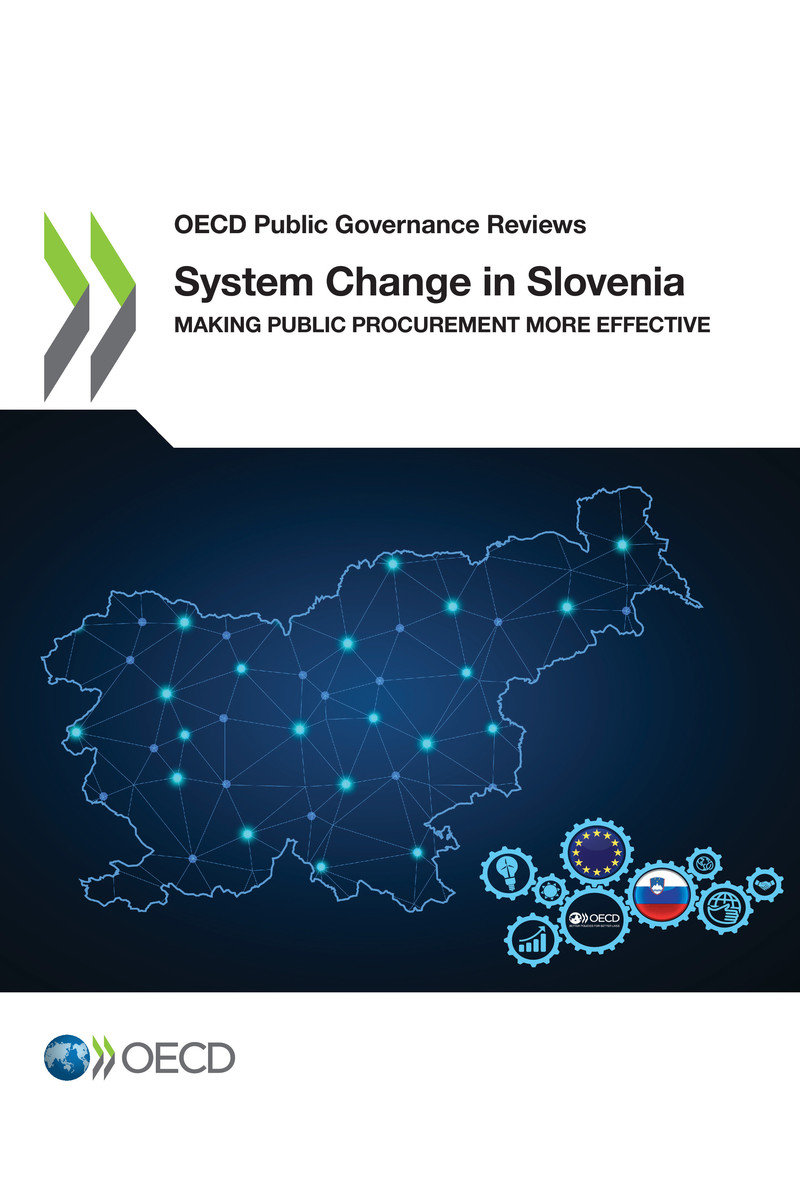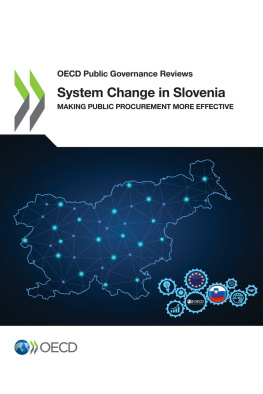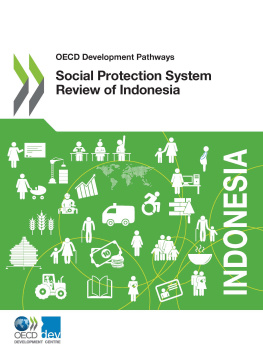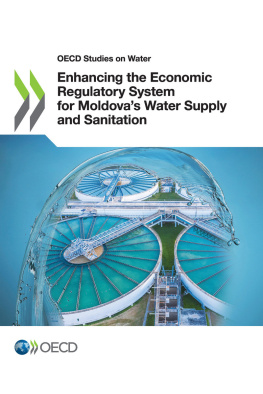OECD - System Change in Slovenia
Here you can read online OECD - System Change in Slovenia full text of the book (entire story) in english for free. Download pdf and epub, get meaning, cover and reviews about this ebook. year: 2020, publisher: OECD Publishing, genre: Politics. Description of the work, (preface) as well as reviews are available. Best literature library LitArk.com created for fans of good reading and offers a wide selection of genres:
Romance novel
Science fiction
Adventure
Detective
Science
History
Home and family
Prose
Art
Politics
Computer
Non-fiction
Religion
Business
Children
Humor
Choose a favorite category and find really read worthwhile books. Enjoy immersion in the world of imagination, feel the emotions of the characters or learn something new for yourself, make an fascinating discovery.
System Change in Slovenia: summary, description and annotation
We offer to read an annotation, description, summary or preface (depends on what the author of the book "System Change in Slovenia" wrote himself). If you haven't found the necessary information about the book — write in the comments, we will try to find it.
OECD: author's other books
Who wrote System Change in Slovenia? Find out the surname, the name of the author of the book and a list of all author's works by series.
System Change in Slovenia — read online for free the complete book (whole text) full work
Below is the text of the book, divided by pages. System saving the place of the last page read, allows you to conveniently read the book "System Change in Slovenia" online for free, without having to search again every time where you left off. Put a bookmark, and you can go to the page where you finished reading at any time.
Font size:
Interval:
Bookmark:

OECD (2020), System Change in Slovenia: Making Public Procurement More Effective , OECD Public Governance Reviews, OECD Publishing, Paris, https://doi.org/10.1787/b050ef2f-en .
The information in this document with reference to Cyprus relates to the southern part of the Island. There is no single authority representing both Turkish and Greek Cypriot people on the Island. Turkey recognises the Turkish Republic of Northern Cyprus (TRNC). Until a lasting and equitable solution is found within the context of the United Nations, Turkey shall preserve its position concerning the Cyprus issue.
The Republic of Cyprus is recognised by all members of the United Nations with the exception of Turkey. The information in this document relates to the area under the effective control of the Government of the Republic of Cyprus.
Governments need new and innovative approaches to better address ongoing, emergent and societal challenges. Complex issues cannot be solved by single interventions focusing on specific characteristics they need to be tackled systemically. Systems thinking has received increasing recognition in OECD countries as an approach that can help address some of these challenges in a dynamic and holistic way.
Public procurement is an ideal focus for systems thinking approaches. It not only enables the acquisition of necessary products and services, it can also help achieve socio-economic goals and encourage innovation. However, in Slovenia, as in many OECD countries, opportunities exist for greater innovation in the public procurement process and associated systems to enhance the potential for positive impact.
Through the support of the European Commissions Structural Reform Support Programme (SRSP), the OECDs Observatory of Public Sector Innovation (OPSI) ( https://oecd-opsi.org ), in collaboration with the Public Procurement Unit in the OECD Directorate for Public Governance, has partnered with the Slovenian Ministry of Public Administration to apply systems thinking to the public procurement system of Slovenia. The report looks beyond traditional solutions for improving system effectiveness, instead applying a systems approach to assess the potential for creating more innovation within the public procurement system and producing better outcomes for Slovenians.
The report uses over 1 000 data points collected through interviews and workshops, analysis of past and present laws and regulations, and analysis of procurement data from the Slovenian Government and the European Commission. These data are used to map the procurement system and the experience of those responsible for its operation. The report identifies tensions within the procurement system and the underlying factors that explain them. The analysis further shows that the main challenges within the system are behavioural and cultural rather than legal. Finally, the report recommends a series of systemic interventions focused on changing behaviour and culture, and greater collaboration to enhance the effectiveness of the procurement system beyond adherence to existing rules.
This report was prepared by the OECD Directorate for Public Governance (GOV) under the leadership of the Director, Marcos Bonturi.
This report was drafted by Jamie Berryhill and Kevin Richman under the leadership of Piret Tnurist, Lead in Systems Thinking, with contributions and co-ordination from Marco Daglio, Head of the Observatory of Public Sector Innovation (OPSI) within the Open and Innovative Government Division (OIG). Comments and input were provided by Paulo Magina and Matthieu Cahen of the Infrastructure and Procurement Division of GOV. OPSI would also like to recognise the support of Fleur Dsouza, former New Zealand secondee to the Public Sector Integrity team, and the contributions and indispensable assistance of Barbara Topic.
Draft versions of this report were shared and discussed with OPSIs National Contact Points (NCPs), representatives of the European Commission through DG Structural Reform Support (DG REFORM) and members of the Slovenian Public Administration.
The report benefitted from the inputs, reflections and contributions of numerous Slovenian stakeholders, obtained through interviews, discussions, workshops and correspondence. This report would not have been possible without the support of the Ministry of Public Administration. OPSI is particularly grateful to the Ministry staff for their assistance in collecting data and information, organising fact-finding missions and workshops for the team in Ljubljana, and providing feedback throughout the development of the report. The team would especially like to thank Sao Matas, Urka Skok Klima, Jelena Tabakovi and Matija Kodra.
The OECD would also like to express its gratitude to the European Commission, in particular to Mina Shoylekova from the Directorate-General for Structural Reform Support (DG REFORM), for providing the space, knowledge, guidance and co-operation to approach old problems in new ways. The European Commission Directorate-General for Internal Market, Industry, Entrepreneurship and SMEs (DG GROW), specifically Justyne Balasinska and Natalia Fiedziuk, also provided valuable co-operation, input and guidance.
Special thanks go to Stephen Flynn and Deborah Merran for their administrative support and to Liv Gaunt for editorial assistance.
In order to respond effectively to cross-cutting problems and provide interconnected services to citizens, governments must transform their approach to increasingly complex issues. In the public procurement system of Slovenia, transformation means creating culturally and behaviourally informed procurement strategies that allow for the exploration of new and innovative procurement processes. This will enable the development of a more responsive and effective public procurement system.
The public procurement system of the Government of Slovenia has a strong legal foundation. Reform efforts have been driven by regulatory changes and have focused primarily on increasing transparency and reducing corruption. As a result, Slovenia has become one of the OECD countries that make the most information about the procurement process available to the public. In addition, the government has undertaken efforts to develop a stronger and more innovative procurement system a process that has involved changing procurement laws, updating practice in line with international standards, developing guidance documents for procurement officials and sharing good practices throughout the system. However, in spite of these reforms, highly formalised procedures remain and provide limited flexibility for experimentation and little incentive for the application of new procurement and innovative methods. As a result, innovation around procurement and pre-commercial procurement, and the use of innovative and agile development processes, are rare in the Slovenian public sector.
Font size:
Interval:
Bookmark:
Similar books «System Change in Slovenia»
Look at similar books to System Change in Slovenia. We have selected literature similar in name and meaning in the hope of providing readers with more options to find new, interesting, not yet read works.
Discussion, reviews of the book System Change in Slovenia and just readers' own opinions. Leave your comments, write what you think about the work, its meaning or the main characters. Specify what exactly you liked and what you didn't like, and why you think so.


















